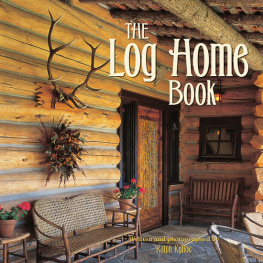Ralph Bergengren - The Comforts of Home
Here you can read online Ralph Bergengren - The Comforts of Home full text of the book (entire story) in english for free. Download pdf and epub, get meaning, cover and reviews about this ebook. year: 2014, publisher: Duke Classics, genre: Detective and thriller. Description of the work, (preface) as well as reviews are available. Best literature library LitArk.com created for fans of good reading and offers a wide selection of genres:
Romance novel
Science fiction
Adventure
Detective
Science
History
Home and family
Prose
Art
Politics
Computer
Non-fiction
Religion
Business
Children
Humor
Choose a favorite category and find really read worthwhile books. Enjoy immersion in the world of imagination, feel the emotions of the characters or learn something new for yourself, make an fascinating discovery.
- Book:The Comforts of Home
- Author:
- Publisher:Duke Classics
- Genre:
- Year:2014
- Rating:3 / 5
- Favourites:Add to favourites
- Your mark:
- 60
- 1
- 2
- 3
- 4
- 5
The Comforts of Home: summary, description and annotation
We offer to read an annotation, description, summary or preface (depends on what the author of the book "The Comforts of Home" wrote himself). If you haven't found the necessary information about the book — write in the comments, we will try to find it.
Massachusetts-born poet, author and critic Ralph Bergengren ponders the joys of domestic life in this series of essays, vignettes, and sketches centered on the family home. Its a charming volume to curl up with in front of a roaring fire or to read as you stretch out in your favorite chair after a long day.
The Comforts of Home — read online for free the complete book (whole text) full work
Below is the text of the book, divided by pages. System saving the place of the last page read, allows you to conveniently read the book "The Comforts of Home" online for free, without having to search again every time where you left off. Put a bookmark, and you can go to the page where you finished reading at any time.
Font size:
Interval:
Bookmark:

First published in 1918
ISBN 978-1-62013-920-2
Duke Classics
2014 Duke Classics and its licensors. All rights reserved.
While every effort has been used to ensure the accuracy and reliability of the information contained in this edition, Duke Classics does not assume liability or responsibility for any errors or omissions in this book. Duke Classics does not accept responsibility for loss suffered as a result of reliance upon the accuracy or currency of information contained in this book.
PROPERLY speaking, the new house was old. A hundred years and more hadgone over its chimney,down which, as we were to discover later, ahundred flies and more would come when the open fires had warmedit,and within doors it would have charmed any amateur of the Colonialby the antiquity of its furnishings. Temporarily it belonged to me, myexecutors, administrators, and assigns. But there were limits to ourpossession. None of us might 'permit any hole to be drilled or made inthe stone or brick-work of said building'; no 'sign or placard' might weplace upon it; we might not 'over-load, damage, or deface' it; nor mightwe 'carry on any unlawful, improper, noisy, or offensive trade' in it.We had admitted that the glass was whole and in good order, and boundourselves to keep it good, unless broken by fire, with glass of the samekind and quality. In case I became bankrupt I had agreed that the owner,the owner's executors, the owner's administrators, and the owner'sassigns should treat me with every form of ignominy that the law has yetinvented to make bankruptcy more distressing. Nor could I hold themresponsible if our guests fell down the cellar stairs; although there Ithink they would be morally responsible, for a steeper flight of cellarstairs I simply cannot imagine.
Of all documents there is hardly another so common as a lease, or moresuspicious. Observe the lessora benevolent, dignified, but cautiousperson! Observe the lesseea worm with criminal tendencies! Perhaps heis a decent sort of worm, but the lessor had better look out for him.Very likely he will commit murders in the dining-room, read the ContesDrolatiques in the library, play bass-drum solos in the parlor, andstart a piggery in the cellar. One suspects that possibly the great armyof hoboes is partly recruited from among supersensitive men who readtheir leases before signing them and preferred vagabondage to insult.But some of us control our sensitiveness. I, for example, read my lease;and when, having agreed mentally to post no placard myself, I discovereda clause allowing the lessor to decorate my residence with theinformation that it was
FOR SALE
I crossed that clause out!
Observe the worm turning!
It was the dining-room that had won us, formerly the kitchen and stillcompletewith the brick oven; the crane; the fat, three-legged pots andspider; a thing that, after much debate, we think must have been abread-toaster; and a kind of overgrown curry-comb with which, so weimagine, the original dwellers were wont to rake the hot ashes from thebrick oven. Also a warming-pan. And although these objects charm me, andI delight to live with them, I cannot but wonder whether a hundred yearsfrom now there may not be persons to furnish their dining-rooms withjust such a stove as stands at present in my real kitchen; and perhapsto suspend beside it one of those quaint contraptions with which thejolly old chaps in the early twentieth century used to kill flies. Ihear in imagination the host of that period explaining the implement tohis wondering guests,being expert in such matters, he will produce thetechnical term 'swat' with an air of easy familiarity,and see himhanging it reverently up again beside the dear old stove and right overthe picturesque old coal-hod. Perhaps, too, he will point out thebeautiful, sturdy lines of the coal-hod.
Now in due time, or, to be exact, some hours later, strong men came tothis house with a motor truck; and, working with concentrated fury, theyput into it all our own furniture, our trunks, our books, our clothes,and everything that was ours. It had been our purpose to direct thesemen: to say, 'This goes here, kind sirs,' and, 'That goes there,gentlemen'; or, 'Believe me, this is the place for that,' or, 'Thankyou, sir, but that is the place for this.' When they had come andgone, and the empty truck had rumbled away in the early autumntwilight, everything was to be just where we had planned in advance;'getting settled' would be a light but satisfying pleasure;organization, 'efficiency in business,' for we had been reading anarticle in a magazine, would have made changing our home as easy aschanging our clothes. But these men were beyond mortal control. Theycame late and their mood was to depart early. Movers always come late,for two reasons: first, because they like to feel that you are glad tosee them, and, second, because they do not like to place each objectjust where it belongs. They prefer concentrated fury. Children ofnature, they inherit their mother's abhorrence of a vacuum; unable, asthey saw at a glance, to stuff the whole house from floors to ceilings,they devoted their attention, brushing us aside like annoying insectsthat they lacked time for killing, to stuffing such rooms as theyinstantly decided could be stuffed the tightest. If there was anythingthat we might presumably need at once, they put it at the bottom andburied it under the heaviest available furniture. It was wonderful tosee them. In the end they actually took money for what they had done andwent away hastily. Organization and 'efficiency in business' hadaccomplished something: the trunks were upstairs, and two barrels hadreached their predestined place in the cellar.
There appears in many business offices, although it is not, so far as Iknow, the official slogan of 'efficiency in business,' a card with themotto, 'Do It Now.' I looked into that room which was destined to be thelibrary: formerly it had been a bedroom, and the four-poster bed andnoble mahogany bureau were to have vanished upstairs before my arrival.But now, peering past and above and under the dbris that the avalanchehad left there, I recognized the noble mahogany bureau in the farcorner, mourning presumably for its departed companion, the four-poster.I beheld it with a misgiving which I tried to put from me, but whichcame back from moment to moment and whispered in whichever ear wasnearer.
'Just suppose,' whispered Misgiving, 'that the man who was hired to takethat bureau upstairs found that it wouldn't go up!!!!'
And I thought of that stairway, that went up furtively from thedining-room which had once been the kitchen, a delightful stairway(especially when one realized what a discouraging time a burglar wouldhave in finding it, and how he would probably find the cellar stairsinstead and die of a broken neck at the bottom), but narrow, narrow; andwith a right angle just where a right angle was least desirable. It hadbeen as much as they could do to get up the trunks.
'You will very likely have to leave the bureau in the library,'whispered Misgiving, 'and that will be inconvenientwon't it?when youhave company. Company will have to dress in the library or else gatherup its clothes and run.''Library!' said Misgiving. 'Who ever heard ofa bureau in a library? People will think the library table is a foldingbed. You can't disguise a noble old bureau like that by putting books onit,' said Misgiving. 'Once a bureau always a bureau.What will yourwife say,' asked Misgiving, 'when she learns that the spare-room bureauhas to stay downstairs in the library?'
Font size:
Interval:
Bookmark:
Similar books «The Comforts of Home»
Look at similar books to The Comforts of Home. We have selected literature similar in name and meaning in the hope of providing readers with more options to find new, interesting, not yet read works.
Discussion, reviews of the book The Comforts of Home and just readers' own opinions. Leave your comments, write what you think about the work, its meaning or the main characters. Specify what exactly you liked and what you didn't like, and why you think so.












